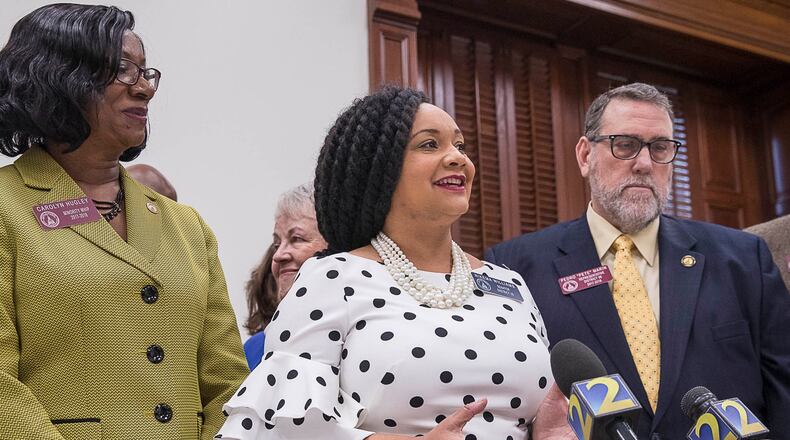Facing the potential of a glut of candidates running for U.S. Sen. Johnny Isakson's seat, Georgia Democrats are set to meet in Atlanta with national party operatives to hone their strategy ahead of a 2020 election featuring two competitive Senate races.
State officials insist the party will play no role in picking favorites for the seat held by Isakson, a three-term Republican who announced last week that he will step down at the end of the year.
But instead they will gather potential contenders for a closed-door huddle next week with strategists from the Democratic Senatorial Campaign Committee and other party figures to assess the demands of the campaign.
“We are making sure the party infrastructure is strong for whoever runs. We are going to sit down with candidates to make sure they know what it takes to run,” said Nikema Williams, a state senator who is chairwoman of the Democratic Party of Georgia.
“I want to make sure we’re set up for the best outcome for the party. What happens in Georgia will shape the 2020 election.”
There are at least a dozen credible Democrats weighing whether to run for Isakson's seat, including U.S. Rep. Lucy McBath, state Sen. Jen Jordan, DeKalb District Attorney Sherry Boston and two statewide contenders from the 2014 race: Michelle Nunn and Jason Carter.
Three Democrats have already announced bids to challenge U.S. Sen. David Perdue – trucking executive Sarah Riggs Amico, Clarkston Mayor Ted Terry and former Columbus Mayor Teresa Tomlinson – and more candidates are expected to soon join that contest.
The free-for-all format of the election for Isakson’s seat opens the door to an array of contenders who otherwise would struggle to win the party’s nod.
While the Democrat in the Perdue contest will be selected in a May party primary, the Isakson contest will feature candidates from all parties on the general election ballot in November. If no candidate gets a majority-vote, the race is headed to a January runoff.
Democrats worry that too many candidates on the same ballot will dilute their message against a Republican appointee who will be selected within the next few months by Gov. Brian Kemp – giving the GOP incumbent a better shot at winning the race outright.
That’s what nearly happened to state Republicans the last federal special election in Georgia, when 18 candidates piled in Georgia’s 6th District race in 2017 to compete for a suburban district long held by the GOP.
With a half-dozen well-funded Republicans competing against each other, Jon Ossoff quickly consolidated Democratic support and nearly won the contest in the first round of voting in April before losing to Republican Karen Handel in a runoff.
About the Author
Keep Reading
The Latest
Featured




